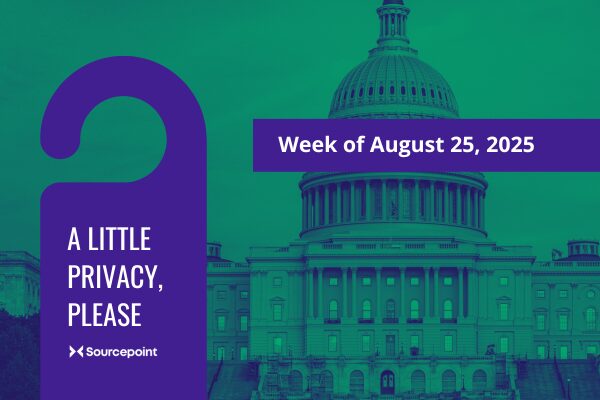Blog
Google’s $30M YouTube Settlement Highlights Growing Children’s Privacy Risks for Digital Platforms
August 26, 2025

Want to receive these privacy recaps in your inbox each week? Subscribe here.
United States
Google Enters $30 Million Settlement In YouTube Children’s Data Class Action.
Google has agreed to a $30 million payment to settle claims, originally filed in 2019 (Case 5:19-cv-07016-SVK in the Northern District of California), alleging that Google’s targeted advertising practices on YouTube violated various state laws, including intrusion upon seclusion, unjust enrichment, and violations of consumer protection statutes.
The unjust enrichment claims were dismissed in a January 2025 order, but the privacy and consumer protection claims overcame Google’s motion to dismiss. Specifically, the Court found that, based on allegations that Google targeted children in connection with YouTube’s data tracking and knew it was collecting children’s data, the plaintiffs sufficiently alleged that Google engaged in actions that constituted a highly offensive intrusion into an area where users maintained a reasonable expectation of privacy. The court also found that the plaintiffs sufficiently alleged under state consumer protection statutes that they suffered a loss in the form of their loss of privacy, allowing them to recover damages under the laws of three states (Indiana, Massachusetts, and New Hampshire) and equitable relief in five states (Florida, Massachusetts, New Hampshire, Michigan and Tennessee).
TAKEAWAY
The filing of this class action in 2019 followed Google’s settlement with the FTC and the New York Attorney General over Children’s Online Privacy Protection Act (COPPA) allegations based on the same activity. Google was enjoined under that settlement from disclosing, using or benefiting from the information previously collected from child viewers of YouTube videos in certain child-directed channels. There is no private right of action under COPPA (and thus the class action couldn’t explicitly make COPPA claims); however, this case highlights the common trend for class action lawsuits to follow in the footsteps of FTC and AG privacy actions, often taking advantage of general consumer protection laws, common law torts, and privacy statutes that do contain a private right of action, such as certain state wiretapping laws.
9th Circuit Finds Hyperlinked Terms of Service “Reasonably Conspicuous” in VPPA Action.
Reversing a lower court decision, the 9th Circuit found, in an action under the Video Privacy Protection Act (VPPA), that defendant Yippee provided reasonably conspicuous notice of an arbitration agreement in the streaming service’s Terms of Service when users signed up for a streaming service subscription, allowing Yippee to compel arbitration in the case, subject to resolution of the remaining items on appeal.
Specifically, the court found that, because the Terms of Service at issue appeared directly above the “Start subscription” button (precisely where a user would expect it within the natural visual path of completing the subscription process) in bright blue font against a clean white background that stood out from the surrounding text, and the conspicuousness was not negated by other hyperlinks or a visually cluttered format, it was fair to assume that a reasonably prudent Internet user would have seen the hyperlink. The Court also found the context of the transaction to be important, holding that a reasonable user subscribing to Yippee’s recurring streaming service would have contemplated some sort of continuing relationship that prompted scrutiny of the website for any contractual obligations or terms.
TAKEAWAY
Class action lawsuits under the VPPA and other laws (such as state wiretapping laws) based on the collection and sharing of user data through tracking technologies have been increasingly prevalent in recent years. As a result, many companies are re-evaluating the content and presentation of their Terms of Use to ensure enforceability of arbitration clauses. Although the 9th Circuit in this case only addressed one element of enforcement under California law, enforcement of website terms also requires that the consumer take some action, such as clicking a button or checking a box, that unambiguously manifests his or her assent to those terms. That second element (along with evaluation of the content of the arbitration clause itself) will be determined on remand to the lower court.
A Little Privacy, Please weekly recaps are provided for general, informational purposes only, do not constitute legal advice, and should not be relied upon for legal decision-making. Please consult an attorney to determine how legal updates may impact you or your business.
Latest Blog Posts
Maryland’s stricter privacy law and $1.3M California fine signal a new compliance era
October 6, 2025Maryland's stricter privacy law takes effect while California issues...
California Privacy Rules Expand in 2026; ICO Backs Meta’s Consent Model as Global Standards Shift
September 29, 2025California Privacy Rules Expand in 2026; ICO Backs Meta's...
Meta CIPA Verdict Upheld as French Cookie Enforcement Distinguishes First vs. Third-Party Responsibilities
September 22, 2025California court upholds Meta's CIPA violation for SDK data...
Latest White Papers
Connecting Legal & Marketing Teams on Consent and Preferences
February 4, 2025Break down data silos and unlock better collaboration. Marketing...
Navigating Sensitive Data in the U.S.
February 4, 2025Download our comprehensive guide to learn how different states...
Enterprise Guide To Cookie management & Tracker List Curation
July 1, 2024How to review the tracking tech on your websites...
Keep in touch
Sign up for our newsletter to keep up with privacy news for adtech and martech,
plus occasional company news.
